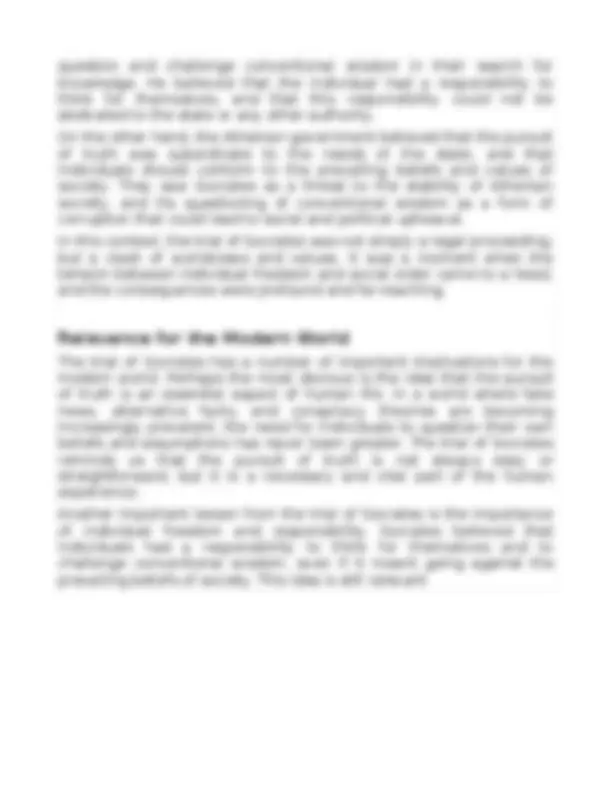



Study with the several resources on Docsity

Earn points by helping other students or get them with a premium plan


Prepare for your exams
Study with the several resources on Docsity

Earn points to download
Earn points by helping other students or get them with a premium plan
Community
Ask the community for help and clear up your study doubts
Discover the best universities in your country according to Docsity users
Free resources
Download our free guides on studying techniques, anxiety management strategies, and thesis advice from Docsity tutors
This essay explores the trial of Socrates and its relevance in the modern world. It examines the key issues at stake in the trial, including the nature of truth, the role of the individual in society, and the relationship between ethics and politics. It also considers the positive and negative impacts of the trial, and the lessons it offers for contemporary society.
Typology: Study notes
1 / 2

This page cannot be seen from the preview
Don't miss anything!


Introduction The trial of Socrates is one of the most famous events in the history of philosophy. It is widely regarded as a pivotal moment in the development of Western philosophy, and its impact continues to be felt to this day. This essay explores the trial of Socrates and its relevance in the modern world. It examines the key issues at stake in the trial, including the nature of truth, the role of the individual in society, and the relationship between ethics and politics. It also considers the positive and negative impacts of the trial, and the lessons it offers for contemporary society. Background Socrates was an ancient Greek philosopher who lived in Athens in the fifth century BCE. He is regarded as one of the founders of Western philosophy, and his ideas have had a profound influence on the development of Western thought. Socrates was known for his method of questioning, which he used to challenge conventional wisdom and encourage critical thinking. He believed that the pursuit of truth was the highest aim of human life, and that individuals should question their own beliefs and assumptions in order to arrive at a deeper understanding of the world around them. In 399 BCE, Socrates was put on trial by the Athenian government on charges of impiety and corrupting the youth. These charges were brought against him by his political enemies, who were threatened by his radical ideas and his influence on the young people of Athens. Despite his eloquent defense, Socrates was found guilty and sentenced to death by drinking hemlock.
The trial of Socrates is a complex and multifaceted event, with a range of different interpretations and perspectives. At its heart, however, the trial was about the conflict between Socrates and the Athenian government over the nature of truth and the role of the individual in society. On the one hand, Socrates argued that the pursuit of truth was the highest aim of human life, and that individuals should be free to
question and challenge conventional wisdom in their search for knowledge. He believed that the individual had a responsibility to think for themselves, and that this responsibility could not be abdicated to the state or any other authority. On the other hand, the Athenian government believed that the pursuit of truth was subordinate to the needs of the state, and that individuals should conform to the prevailing beliefs and values of society. They saw Socrates as a threat to the stability of Athenian society, and his questioning of conventional wisdom as a form of corruption that could lead to social and political upheaval. In this context, the trial of Socrates was not simply a legal proceeding, but a clash of worldviews and values. It was a moment when the tension between individual freedom and social order came to a head, and the consequences were profound and far-reaching.
The trial of Socrates has a number of important implications for the modern world. Perhaps the most obvious is the idea that the pursuit of truth is an essential aspect of human life. In a world where fake news, alternative facts, and conspiracy theories are becoming increasingly prevalent, the need for individuals to question their own beliefs and assumptions has never been greater. The trial of Socrates reminds us that the pursuit of truth is not always easy or straightforward, but it is a necessary and vital part of the human experience. Another important lesson from the trial of Socrates is the importance of individual freedom and responsibility. Socrates believed that individuals had a responsibility to think for themselves and to challenge conventional wisdom, even if it meant going against the prevailing beliefs of society. This idea is still relevant